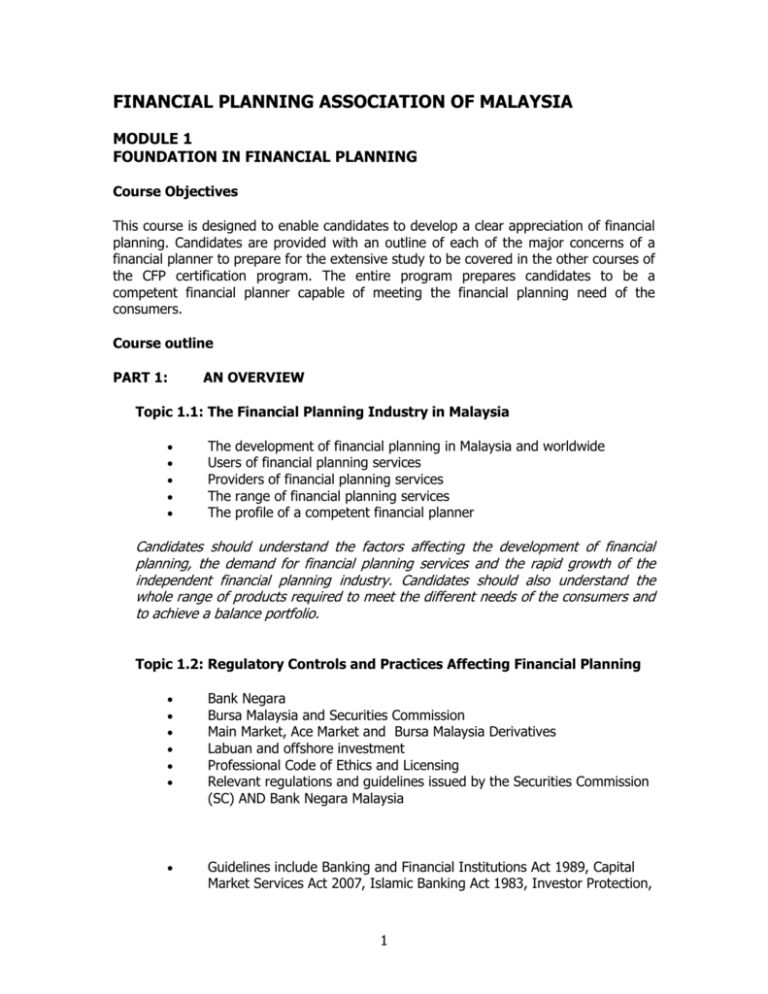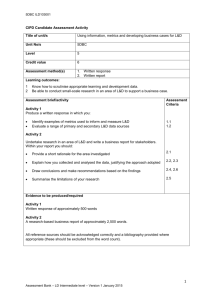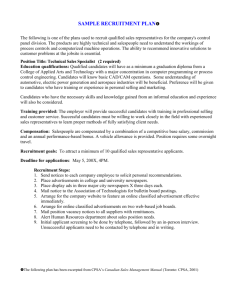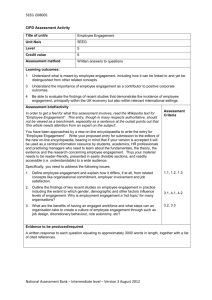
FINANCIAL PLANNING ASSOCIATION OF MALAYSIA
MODULE 1
FOUNDATION IN FINANCIAL PLANNING
Course Objectives
This course is designed to enable candidates to develop a clear appreciation of financial
planning. Candidates are provided with an outline of each of the major concerns of a
financial planner to prepare for the extensive study to be covered in the other courses of
the CFP certification program. The entire program prepares candidates to be a
competent financial planner capable of meeting the financial planning need of the
consumers.
Course outline
PART 1:
AN OVERVIEW
Topic 1.1: The Financial Planning Industry in Malaysia
The development of financial planning in Malaysia and worldwide
Users of financial planning services
Providers of financial planning services
The range of financial planning services
The profile of a competent financial planner
Candidates should understand the factors affecting the development of financial
planning, the demand for financial planning services and the rapid growth of the
independent financial planning industry. Candidates should also understand the
whole range of products required to meet the different needs of the consumers and
to achieve a balance portfolio.
Topic 1.2: Regulatory Controls and Practices Affecting Financial Planning
Bank Negara
Bursa Malaysia and Securities Commission
Main Market, Ace Market and Bursa Malaysia Derivatives
Labuan and offshore investment
Professional Code of Ethics and Licensing
Relevant regulations and guidelines issued by the Securities Commission
(SC) AND Bank Negara Malaysia
Guidelines include Banking and Financial Institutions Act 1989, Capital
Market Services Act 2007, Islamic Banking Act 1983, Investor Protection,
1
Guidelines, Anti Money Laundering and Anti Terrorism Financing Act
2001, Guidelines on Anti Money Laundering by the Securities
Commission, Malaysia Deposit Insurance Corporation Act 2011,
Guidelines on the Offering of Structured Products by the Securities
Commission, Guidelines on Product by Bank Negara, Securities
Commission – Guidance Notes on secondary trading of FCY denominated
debentures and FCY denominated Islamic securities, Exchange Control
Notices
Candidates should understand how various regulatory controls affect the activities of a
financial planner and how to minimize the risk of legal action in the course of providing
financial planning services. The relevant guidelines (acts) therefore are necessary to be
covered in the topic in order for candidate to understand how various regulatory
controls may affect the activities of financial planner.
Topic 1.3: The Nature and Scope of Financial Planning
Definition of financial planning
Process of financial planning
- Budget Planning
- Managing cash flow and basic assets
- Risk management and insurance planning
- Investment planning
- Tax planning
- Retirement/estate planning
- Islamic products and their uses in financial planning
The trade-off concept
The objectives of financial planning
Marketing a financial planning business
Risk profiles of investors
Candidates should understand that to be competent financial planners, they must
know how to integrate different disciplines into a comprehensive plan. In order to do
so, they should develop skills and adhere to processes, including environmental
analysis, investment analysis, spreading of risk, in matching clients' needs and
objectives.
Topic 1.4: Analytical Tools for Financial Planners
The time value of money I: Rudimentary Concepts and Applications
The time value of money II: Advanced Concepts and Applications
Insights on Risk Tolerance in Financial Decisions
Understanding and using business statistics
The impact of the development of IT on financial planning
2
Compiling a financial plan involves the use of problem solving techniques and
requires skill in processing and analyzing data. Candidates should therefore develop
the necessary analytical skills required by financial planners.
Topic 1.5: Effective Communication in Client Counseling
Types of structured communication
Basic of financial counseling
Profile of financial counseling
Essential communication principles
Effective communication is the foundation stone in effective clients counseling.
Candidates should understand the various principle and development of effective
communication to enhance their overall skills as a financial planner.
PART 2:
THE ECONOMIC ENVIRONMENT AND ITS EFFECTS ON
FINANCIAL PLANNING
Topic 2.1: The economic system
The basic economic structure
The basic demographic structure
The role of government
The role of the private sector
Investment Incentives
Candidates should gain an appreciation of the basic economic and demographic
structures of Malaysia. It is important to understand how the government manages
the economy to provide economic growth and development, and the role of the
private sector in the functioning of the economy.
Topic 2.2: The economic environment
Economic growth
The business cycle
Inflation
Economic indicators
Candidates should understand factors affecting economic growth and how they will
in turn affect investment returns and how important it is to the financial planning
industry. Likewise, it is important to understand the behavior of the business cycle
which influences the timing of investments, the effects of inflation on financial
planning and the usefulness of economic indicators in identifying the phase of the
business cycle in which the economy resides.
3
Topic 2.3: Government policy
National savings
Exchange rate policy
Fiscal policy and taxation
Monetary policy and interest rates
Wages policy
The NDP and NEP
EPF Act
Exchange Controls
Islamic practices and policies
Candidates should understand the principles guiding the government's fiscal,
monetary, exchange rate and wages policies in managing the economy. Further,
candidates should also understand the role of the EPF in providing for social security
and how the various EPF schemes affect national savings and investments.
PART 3:
RISK MANAGEMENT AND INSURANCE PLANNING
Topic 3.1 The concept of risk
Definition of risk
Categories of risk
Risk identification
Risk evaluation
Candidates will be introduced to the two broad categories of risks - "speculative
risks" and "pure risks", and the necessity of identifying and evaluating risks in
financial planning.
Topic 3.2: The management of risk
Risk
Risk
Risk
Risk
avoidance
control
financing
transfer through insurance
Candidates should understand the various methods of handling risk including how
risk can be avoided, reduced, eliminated, financed, retained an transferred through
insurance.
Topic 3.3: The insurance industry
The regulators
Professional bodies : LIAM/PIAM/MII/NAMLIA
4
The operators
Candidates should have a good knowledge of the Insurance Act and how the
regulators monitor the sound operation of the insurers. Candidates should also
understand how the professional bodies attempt to maintain the professional
standard of insurance agents and brokers.
Topic 3.4: Types of insurance cover
Life insurance
Health and disability insurance
General insurance
Commercial insurance
Islamic insurance
Candidates should understand the different types of insurance covers that are
available and the ways in which these covers can be used effectively for risk
management. Different types of insurance can be used to protect loss of income as a
result of death, sickness or disability and to protect property loss due to fire or motor
accident.
PART 4:
INVESTMENT PLANNING
Topic 4.1: Concepts of investment
Objectives and rewards of investing
Concept and advantage of portfolio investment
Definition of risk and importance of risk management
Candidates should understand the need for investment to achieve financial goals and
the advantages of portfolio investment in spreading risk.
Topic 4.2: Primary investment
Overview of equity market
Overview of debt market
Overview of the foreign exchange market
Overview of Islamic investment products namely banking products,
investment products, Takaful (insurance) products and investment-linked
products
Overview of the property market
Factors to consider in comparing primary investments
Candidates should understand the two basic primary investment markets - the equity
market and the debt market - where investors make their own decisions and invest
5
directly in them. In making decision, it is important to know and compare the
difference in the risk-return trade-off for the different types of primary investments.
Topic 4.3: Managed investments
Unit trusts
Real Estate Investment Trusts (REIT)
Investment trusts
Exchange traded funds (ETF)
Investment-linked insurance products
Federation of Investment Managers in Malaysia (FIMM)
Candidates should understand the advantages and disadvantages of managed
investments vis-à-vis primary investments. It is important to know the various types
of managed investments so that financial planners are able to select the ones that
match their clients' needs.
PART 5: INCOME TAX PLANNING
Topic 5.1: Basic income tax concept
Basis of assessment
Residency
Calculation of gross income
Deductions
Reliefs
Tax computation
Real property gains tax
In advising how financial goals can be better achieved through minimization and
deferment of income taxation, candidates should have a good understanding of the
definition of income, types of income and how deductions and rebates can help to
alleviate the income tax burden.
Topic 5.2: Income tax planning
Tax planning for employees
Tax planning for businesses
Insurance premiums and benefits
Candidates should understand that significant savings could be made through proper
tax planning for employees and also for businesses. In addition, candidates should
know the taxation treatment of insurance premiums and benefits.
6
PART 6: RETIREMENT PLANNING/ESTATE PLANNING
Topic 6.1: The retirement planning process
Estimate the amount of income needed during retirement – Income
replacement and expense methods
Estimate the capital needs for retirement
Evaluate the current resources - EPF savings and Non-EPF savings
Formulate strategies for filling retirement income deficit
Financial planners should be able to help clients estimate the amount of retirement
income required so as to maintain a certain standard of living during retirement.
They should be able to identify the resources available and recommend a financial
plan to meet that need. Financial planners should know the advantages and
disadvantages of the various retirement planning instruments.
Topic 6.2: The estate planning process
Definition of estate planning
Role of an estate planner
Techniques for preserving wealth
Role of life insurance in estate planning
Types of trusts
Taxation of trusts
Wills
Syariah Law in relation to estate planning
Candidates should understand that planning for conservation and distribution of a
client's accumulated wealth at time of death is an important part of overall financial
planning and should be coordinated with other facets of the total plan. It is
important that the candidates gain knowledge of the various techniques that can be
used to preserve a client's wealth.
PART 7: THE BASIS OF A FINANCIAL PLAN
Understanding the client
The data gathering process
Financial analysis of data
Understanding strategies to meet needs
Plan preparation
Plan implementation
The review process
7
Candidates should understand the basic mechanics of a financial plan. The process
should be emphasized, as each step from the data fathering to review is essential to the
successful implementation of the financial plan.
PART 8: CODE OF ETHICS
A high ethical standard is the hallmark of a professional financial planner. Candidates
should and be able to quote the principles and rules of FPAM’s Member’s Code of Ethics
and Professional Responsibility.
Professional ethics
The Client and Code of Ethics
FPAM Code of Ethics
Principles of FPAM Code of Ethics
8
Financial Planning Association of Malaysia
Recommended Reading List for Module 1 – Foundation in Financial Planning
Type
Title
Book
Block, Hirt (2005), Foundations of Financial Management, 11th
Edition, Mc Graw Hill (2005)
Kapoor, Dlabay, Hughes (2204), Personal Finance, 7th Edition, Mc
Graw Hill (2004)
Brigham, Houston (2004), Fundamentals of Financial Management,
10th Edition, Thomson South-Western (2004)
Harrison (2002), Personal Financial Planner, 2nd Edition, Prentice
Hall (2002)
Ross, Westerfield, Jordan (2006), Corporate Finance Fundamentals,
7th Edition, Mc Graw Hill (2006)
Gitman (2006), Principles of Managerial Finance, 11th Edition,
Pearson Addison Wesley (2006)
Brealey, Myers, Marcus (2004), Fundamentals of Corporate Finance,
4th Edition, Mc Graw Hill (2004)
Lee Hock Lock (2001), Financial Security in Old Age -Whither The
Employees Provident Fund of Malaysia?, Pelanduk Publications
(2001)
Type
Articles
Type
Webs
Title
60 short essays compilation in ‘Investing Your Savings”, a book
written by Yeoh Keat Seng
Organization
Web Address
Federation of Investment Managers
Malaysia
Bursa Malaysia
Securities Commission of Malaysia
Bank Negara Malaysia
www.fmutm.com.my
Relevant Journals
www.ssrn.com
9
www.klse.com.my
www.sc.com.my
www.bnm.gov.my
10









